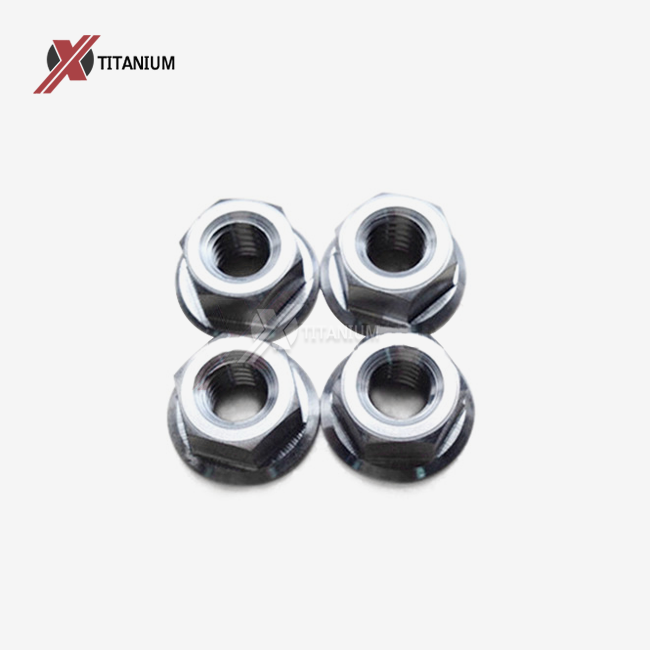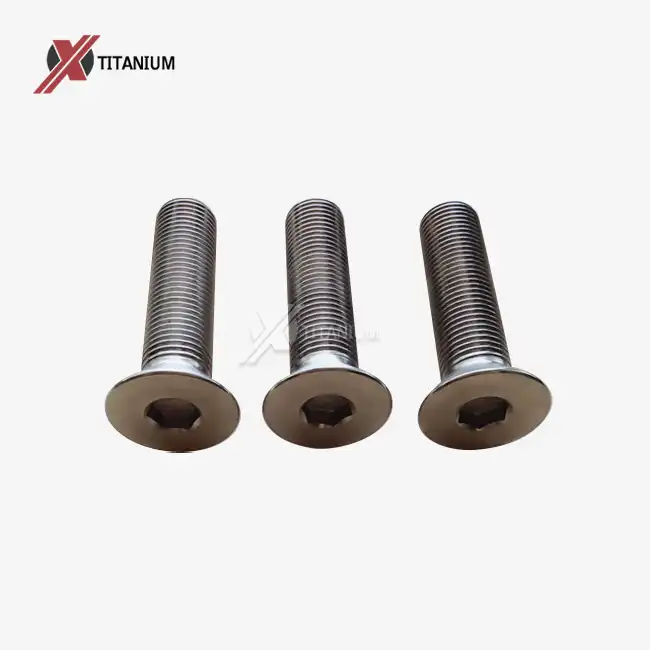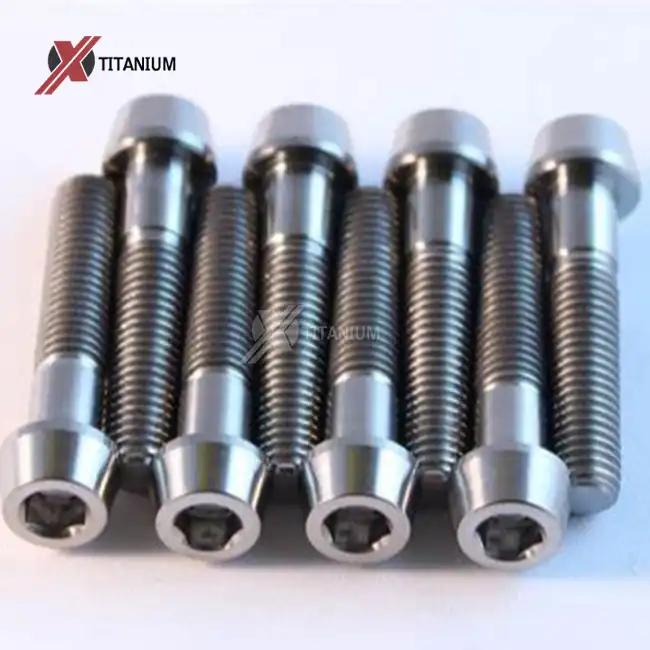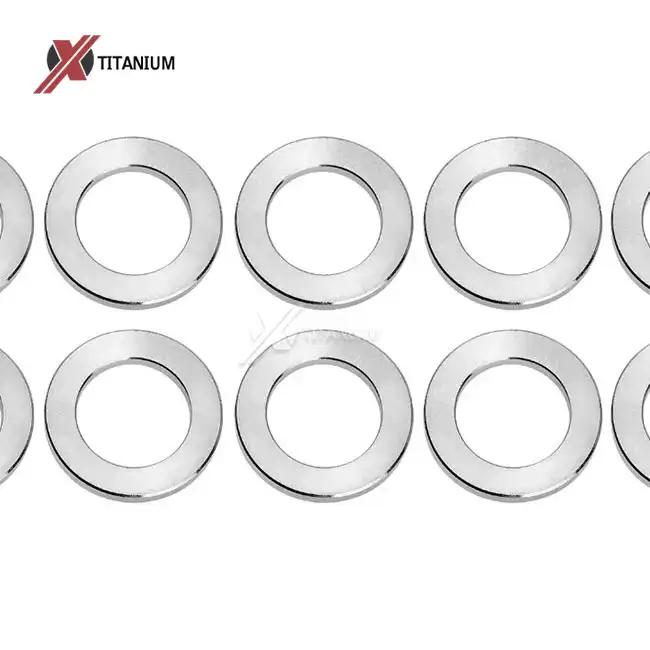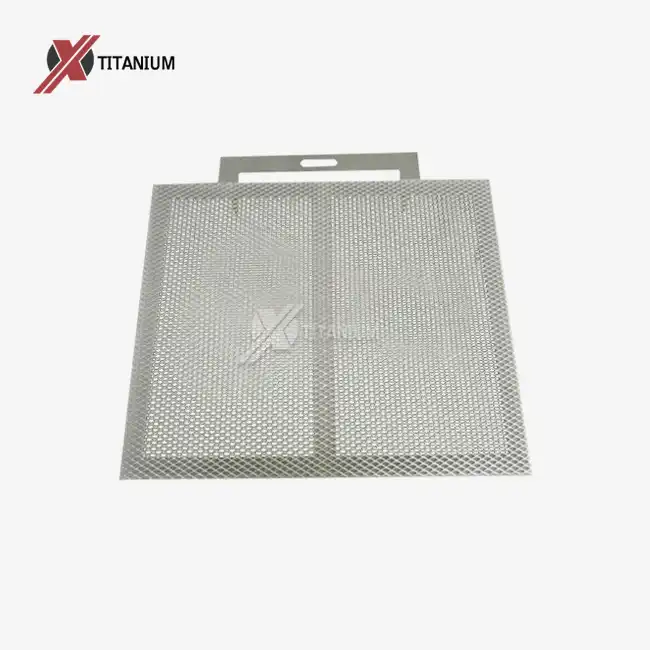The Unparalleled Advantages of Titanium Flange Nuts in Aerospace Applications
Titanium flange nuts have become indispensable in the aerospace industry, offering a unique combination of properties that make them ideal for high-performance aircraft applications. The aerospace sector demands materials that can withstand extreme conditions while maintaining structural integrity, and titanium flange nuts meet these requirements with flying colors.
Lightweight Yet Robust: The Strength-to-Weight Ratio Advantage
One of the most significant advantages of titanium flange nuts is their exceptional strength-to-weight ratio. In the aerospace industry, where every gram counts, these fasteners provide the necessary strength without adding excessive weight to the aircraft. This characteristic allows engineers to design more fuel-efficient and agile aircraft without compromising on structural integrity.
Titanium flange nuts typically boast a strength-to-weight ratio that surpasses that of steel by a considerable margin. This means that for the same weight, titanium fasteners can handle much higher loads, making them ideal for critical aerospace applications where both strength and weight savings are paramount.
Corrosion Resistance: Ensuring Longevity in Harsh Environments
Aerospace components are often exposed to harsh environmental conditions, including extreme temperatures, moisture, and corrosive substances. Titanium flange nuts excel in this area due to their inherent corrosion resistance. The formation of a stable, protective oxide layer on the surface of titanium provides exceptional resistance to various forms of corrosion, including pitting and stress corrosion cracking.
This corrosion resistance translates to longer service life and reduced maintenance requirements for aerospace structures. It also ensures that the fasteners maintain their structural integrity over time, even when exposed to challenging environments such as saltwater spray or acidic pollutants in the atmosphere.
Temperature Tolerance: Performing Under Extreme Conditions
Aerospace applications often involve exposure to extreme temperatures, both high and low. Titanium flange nuts maintain their mechanical properties across a wide temperature range, making them suitable for use in various aircraft components, from engine compartments to external structures.
The high melting point of titanium (around 1,668°C or 3,034°F) ensures that these fasteners remain stable at temperatures where other materials might fail. This temperature tolerance is crucial for components near engines or in areas subject to high frictional heat during flight.
Critical Specifications for Aerospace-Grade Titanium Flange Nuts
When selecting titanium flange nuts for aerospace applications, several critical specifications must be considered to ensure optimal performance and compliance with industry standards.
Material Grade: The Foundation of Performance
The most commonly used titanium alloy for aerospace flange nuts is Ti-6Al-4V (Grade 5). This alloy offers an excellent balance of strength, weight, and corrosion resistance. It typically contains 6% aluminum and 4% vanadium, which enhance its mechanical properties.
Other grades, such as Ti-3Al-2.5V (Grade 9) or Ti-5Al-2.5Sn (Grade 6), may be used for specific applications depending on the required properties. The choice of material grade significantly influences the overall performance of the flange nut in aerospace applications.
Thread Specifications: Ensuring Precise Fit and Function
Thread specifications are crucial for proper fastener performance. For aerospace titanium flange nuts, common thread sizes range from M3 to M36, with custom sizes available for specific applications. The thread pitch and profile must adhere to aerospace standards to ensure compatibility and proper load distribution.
Unified National Fine (UNF) threads are often preferred in aerospace applications due to their finer pitch, which provides greater tensile strength and resistance to vibration loosening. The thread class, which defines the fit between the nut and bolt, is typically specified as 2B for internal threads in aerospace-grade titanium flange nuts.
Surface Finish and Treatment: Enhancing Performance and Aesthetics
The surface finish of titanium flange nuts plays a vital role in their performance and appearance. Common surface treatments for aerospace applications include:
- Polishing: Improves smoothness and reduces friction
- Anodizing: Enhances corrosion resistance and provides color coding options
- Nitriding: Increases surface hardness and wear resistance
These surface treatments can be customized to meet specific aerospace requirements, such as electrical conductivity or enhanced lubricity. The choice of surface finish can also affect the fastener's resistance to galling, a common concern with titanium components.
Ensuring Compliance: Standards and Certifications for Aerospace Titanium Flange Nuts
Adherence to industry standards and certifications is paramount in the aerospace sector, where safety and reliability are non-negotiable. Titanium flange nuts used in aerospace applications must meet stringent requirements set forth by various regulatory bodies and industry standards.
Aerospace Industry Standards: Meeting Exacting Requirements
Several key standards govern the production and use of titanium flange nuts in aerospace applications:
- AS9100: The quality management system standard for the aerospace industry
- ASTM F467: Standard Specification for Nonferrous Nuts for General Use
- MIL-DTL-32014: Detail Specification for Nuts, High Temperature, Nonmagnetic, Nickel Base Alloy
- NAS (National Aerospace Standards): Various specifications for aerospace fasteners
Compliance with these standards ensures that titanium flange nuts meet the rigorous performance and safety requirements of the aerospace industry. Manufacturers must demonstrate adherence to these standards through rigorous testing and documentation processes.
Material Traceability and Lot Control
In aerospace applications, material traceability is crucial. Each titanium flange nut must be traceable back to its original material lot, allowing for comprehensive quality control and the ability to identify and isolate any potential issues.
Lot control involves maintaining detailed records of raw materials, manufacturing processes, and testing results for each batch of titanium flange nuts. This level of control ensures that any quality issues can be quickly identified and addressed, minimizing potential risks in aerospace applications.
Quality Assurance and Testing Protocols
Rigorous quality assurance and testing protocols are essential for aerospace-grade titanium flange nuts. These may include:
- Non-destructive testing (NDT) techniques such as X-ray inspection or ultrasonic testing
- Mechanical property testing, including tensile strength and hardness tests
- Chemical composition analysis to ensure material purity
- Dimensional inspections to verify compliance with specified tolerances
These testing protocols help ensure that each titanium flange nut meets the exacting standards required for aerospace applications, providing peace of mind to engineers and end-users alike.
Conclusion
Titanium flange nuts play a critical role in aerospace applications, offering a unique combination of strength, light weight, and corrosion resistance. Understanding the key specifications and standards that govern these components is essential for engineers and procurement specialists in the aerospace industry. By selecting the right titanium flange nuts, manufacturers can enhance the performance, safety, and longevity of their aerospace structures.
For more information on high-quality titanium flange nuts and other titanium products for aerospace applications, please contact Baoji Chuanglian New Metal Material Co., Ltd. at info@cltifastener.com or djy6580@aliyun.com. Our team of experts is ready to assist you in finding the perfect titanium solutions for your aerospace needs.
